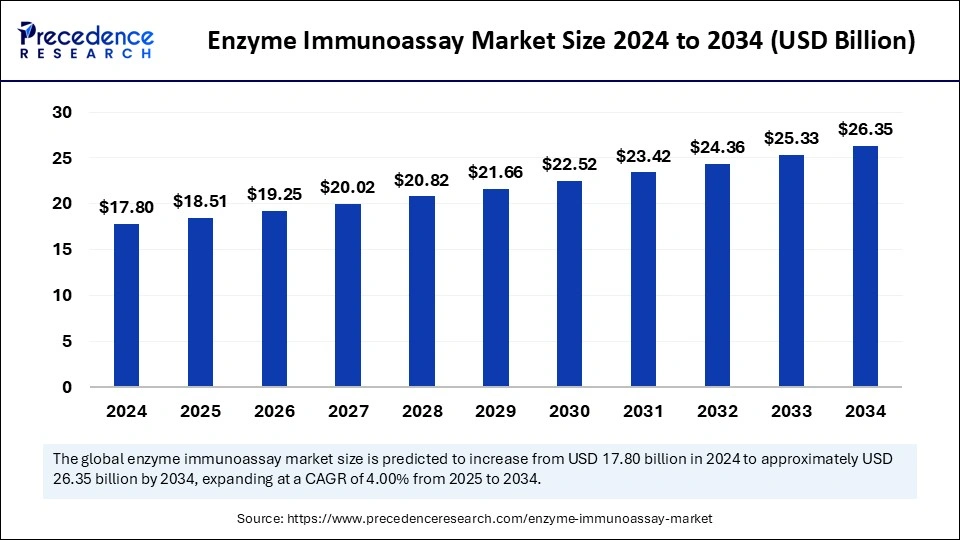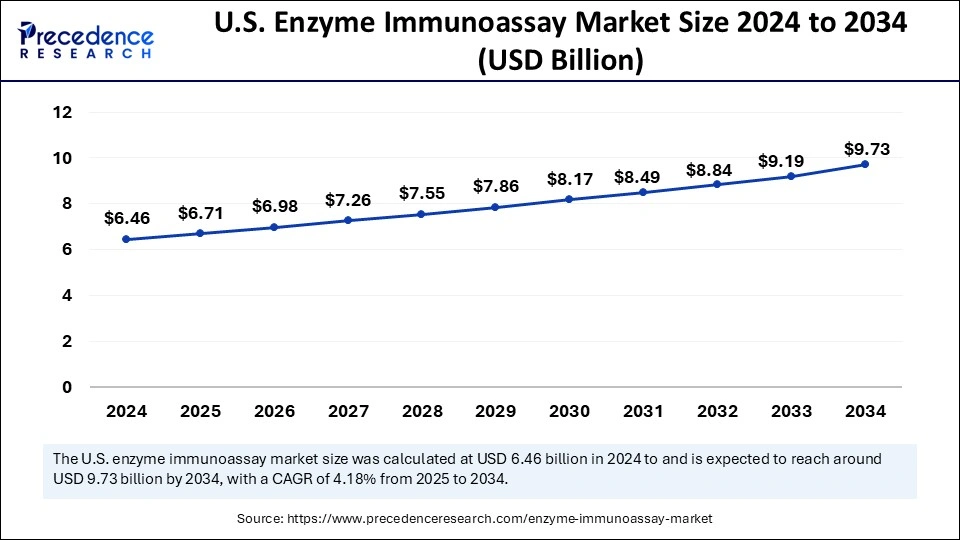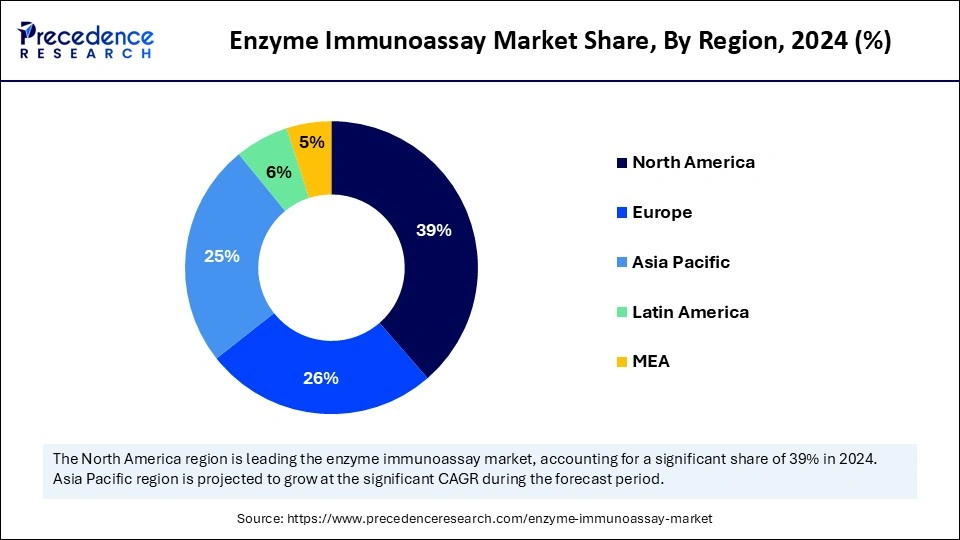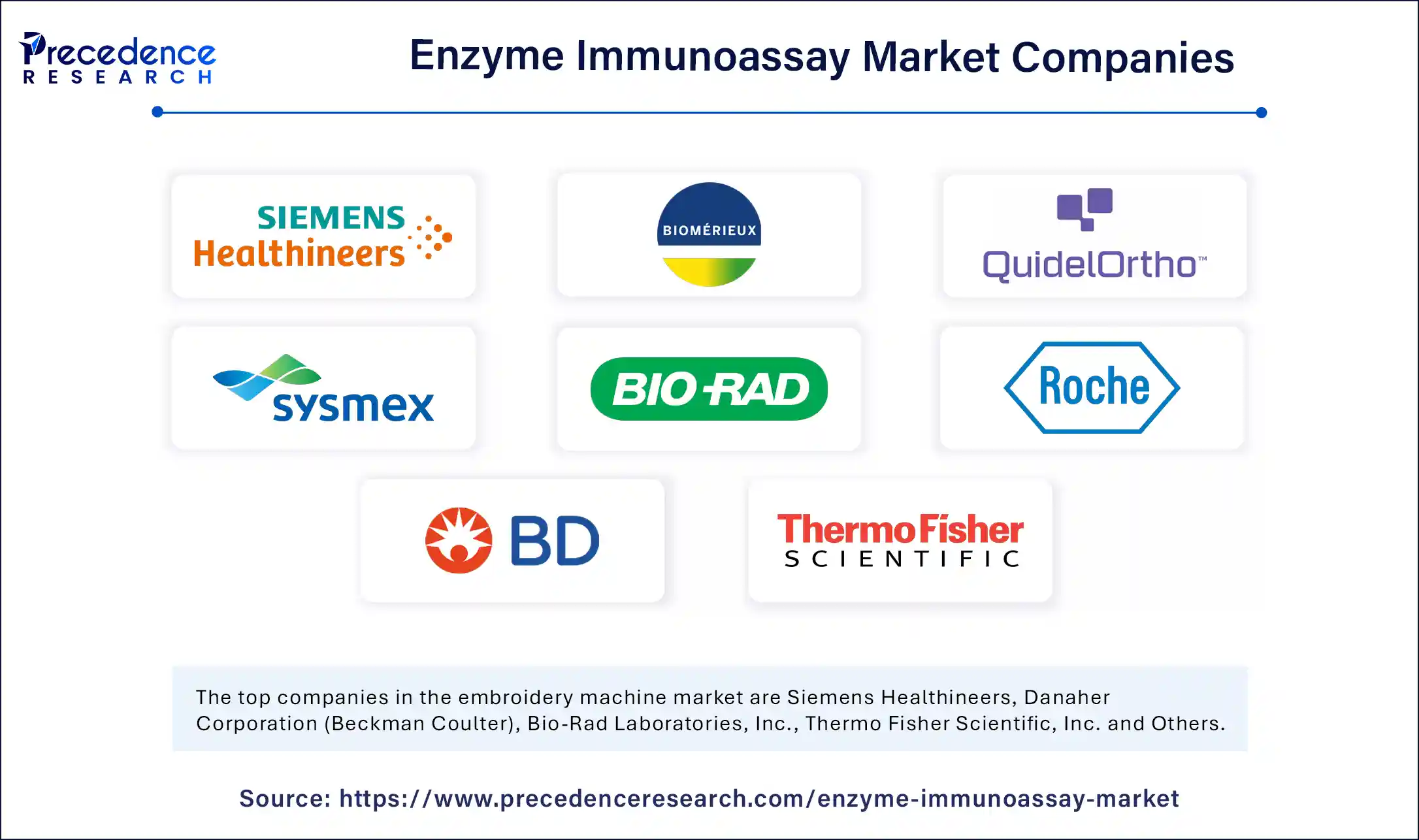April 2025
The global enzyme immunoassay market size is calculated at USD 18.51 billion in 2025 and is forecasted to reach around USD 26.35 billion by 2034, accelerating at a CAGR of 4.00% from 2025 to 2034. The North America market size surpassed USD 6.94 billion in 2024 and is expanding at a CAGR of 4.13% during the forecast period. The market sizing and forecasts are revenue-based (USD Million/Billion), with 2024 as the base year.
The global enzyme immunoassay market size accounted for USD 17.80 billion in 2024 and is predicted to increase from USD 18.51 billion in 2025 to approximately USD 26.35 billion by 2034, expanding at a CAGR of 4.00% from 2025 to 2034. The enzyme immunoassay sector is expanding quickly because of an increased need for prompt disease detection and trustworthy, non-invasive methods.

Artificial intelligence (AI) is transforming the enzyme immunoassay market by enhancing diagnostic precision, effectiveness, and speed. AI technologies are being integrated into immunoassay systems to enhance data analysis, automate procedures, and minimize human mistakes by increasing the accuracy and efficiency of results. The incorporation of AI with high throughput systems and cloud-based platforms facilitates extensive testing while maintaining reliable accuracy in clinical diagnostics and research.
The U.S. enzyme immunoassay market size was exhibited at USD 6.46 billion in 2024 and is projected to be worth around USD 9.73 billion by 2034, growing at a CAGR of 4.18% from 2025 to 2034.

Innovative Diagnostics Propels the Dominance of North America
North America dominated the enzyme immunoassay market in 2024 because of its sophisticated healthcare system, substantial investments in research and development, and prompt adoption of innovative diagnostic technologies. The strong healthcare infrastructure of the region enables extensive implementation of enzyme immunoassays in hospitals, diagnostic labs, and research facilities. The widespread occurrence of chronic and infectious illnesses such as cancer, diabetes, and heart disease increases the need for accurate diagnostics. A robust Research and Development ecosystem, supportive regulatory conditions, and technological progress such as AI, automation, and high-throughput systems improve the effectiveness and precision of enzyme immunoassays. These elements guarantee that North America stays at the leading edge of the market.
The U.S. Market Trends
The U.S. leads the enzyme immunoassay market, supported by a robust healthcare system and engaged biotechnology companies. Increasing chronic and infectious illnesses drive the demand for enzyme immunoassay. Major firms such as Abbott and Thermo Fisher Scientific allocate resources to Research and Development. The Food and Drug Administration expedites the approval process for diagnostic technologies, whereas organizations like the Centers for Disease Control and Prevention and the National Institutes of Health promote enzyme immunoassay integration into public health programs.

Asia Pacific is the Future Hub for Enzyme Immunoassay
Asia Pacific is anticipated to grow at the fastest rate in the market during the forecast period, driven by elements like heightened healthcare funding, rising disease prevalence, advancements in biotechnology, government actions, and a broader role for the private sector. Nations such as China, India, Japan, and South Korea are putting resources into healthcare infrastructure and enhancing diagnostic capabilities, resulting in an increased demand for precise diagnostic tools like enzyme immunoassays. The area is increasingly emerging as a center for biotechnology and pharmaceutical advancements, with firms creating affordable and precise enzyme immunoassay kits designed for local healthcare requirements. Governments are allocating resources to healthcare reforms and public health initiatives to improve diagnostic abilities and disease monitoring.
India: A Key Force in the Market
The enzyme immunoassay market in India is expanding due to rising healthcare demand, government efforts, and biotechnology breakthroughs. The nation encounters a substantial challenge with infectious and chronic ailments, requiring precise diagnostic instruments. Government initiatives such as the National Tuberculosis Elimination Program incorporate enzyme immunoassays for early identification. The booming biotechnology industry and economical manufacturing capabilities of India facilitate the production of affordable enzyme immunoassay kits by satisfying both local and international needs.
China: A Leading Manufacturer in Enzyme Immunoassay
The enzyme immunoassay market in China is rapidly expanding because of healthcare facility investments, a high disease rate, and advances in diagnostic technologies. The government has emphasized public health programs to enhance disease identification, with enzyme immunoassays being crucial in widespread testing for infectious and chronic illnesses. Partnerships between international firms such as Fujirebio and regional healthcare organizations highlight the incorporation of sophisticated automated immunoassay technologies. Robust manufacturing strength and emphasis on the technological advancement of China establish it as a significant contender in the global market. The increasing incidence of chronic conditions and infectious diseases demands efficient diagnostic methods by propelling the market forward.
Europe: A Notable Region in the Enzyme Immunoassay Sector
Europe is expected to grow at a considerable rate in the upcoming period because of its emphasis on innovative healthcare systems, strong regulatory standards, and significant rates of chronic illnesses. Nations such as Germany, France, and the UK are at the forefront of adopting innovative diagnostic technologies. Europe also gains from governmental programs and financial support for healthcare improvements, including the initiatives by the European Union for disease monitoring and public health systems. Top diagnostic firms and laboratories, like BioMérieux and Siemens Healthineers, play a crucial role in market expansion via innovations and collaborations.
The enzyme immunoassay market represents an important segment of the immunoassay sector, employing enzyme-linked antibodies to identify and measure proteins or antigens in biological samples. This method is commonly utilized in clinical diagnostics, pharmaceutical analysis, and food safety testing because of its great sensitivity and specificity. The market is a rapidly evolving part of the diagnostics sector, employing enzymes as markers to identify and measure substances such as proteins, hormones, antigens, and antibodies. These tests are essential for diagnostic evaluations, biomedical studies, quality assurance, and industrial uses.
The market holds great importance in the in-vitro diagnostics industry because of its exceptional specificity, sensitivity, and versatility across different formats, shaped by factors like the increase in chronic illnesses, point-of-care testing, and advancements in biotechnology. Progress in automation, AI incorporation, and tailored medicine continues to drive its growth, tackling the rising incidence of chronic and infectious illnesses.
| Report Coverage | Details |
| Market Size by 2034 | USD 26.35 Billion |
| Market Size in 2025 | USD 18.51 Billion |
| Market Size in 2024 | USD 17.80 Billion |
| Market Growth Rate from 2025 to 2034 | CAGR of 4.00% |
| Dominated Region | North America |
| Fastest Growing Market | Asia Pacific |
| Base Year | 2024 |
| Forecast Period | 2025 to 2034 |
| Segments Covered | Product, Specimen , Application, End-Use, and Regions |
| Regions Covered | North America, Europe, Asia-Pacific, Latin America and Middle East & Africa |
Rising prevalence of chronic and infectious diseases
The primary factor propelling the enzyme immunoassay market is the rising prevalence of chronic and infectious diseases worldwide, including ailments such as diabetes, cardiovascular conditions, and cancer. This, in turn, enhances the need for timely and precise diagnostic techniques. This trend seeks to enhance patient results and lessen disease impact, requiring the creation of effective diagnostic instruments for disease identification and management. Enzyme immunoassay, an economical and effective approach for early disease identification and monitoring, is a favored option in clinical diagnostics.
Interference in enzyme immunoassay
The enzyme immunoassay market encounters considerable restraints from interference in immunoassay, potentially resulting in imprecise results and adverse clinical consequences. Elements leading to this problem consist of production flaws, pollution, and incorrect test applications. Removing these interferences continues to be a major challenge since no single approach can entirely eliminate them.
Rising demand for effective diagnostic tools in healthcare establishments
The enzyme immunoassay market is set to expand due to the rising demand for effective diagnostic tools in healthcare establishments. Incorporating complex technology can improve assay sensitivity, specificity, and efficiency, providing a significant opportunity for companies to invest in innovative approaches. Technological advancements in enzyme immunoassays, such as chemiluminescence, fluorescence, and sophisticated kits, have improved sensitivity, specificity, and throughput, minimizing manual intervention and errors in large-scale diagnoses.
The reagents and kits segment dominated the enzyme immunoassay market in 2024. This is because of their wide-ranging applications in clinical diagnostics, pharmaceutical analysis, and food safety assessments. Enzyme immunoassay reagents and kits are essential in identifying diseases such as HIV, hepatitis, and cancer, owing to their remarkable sensitivity and specificity. The growing prevalence of infectious and chronic illnesses has heightened the need for dependable diagnostic tools, rendering them essential in healthcare environments.
The software and services segment is projected to expand rapidly in the market in the coming years, driven by the rising complexity of tests and the demand for precise results. As laboratories and healthcare institutions enhance their diagnostic capabilities, they are more frequently adopting advanced software solutions for data management and accuracy. The increasing need for automation in laboratories is fueled by elements like efficiency, data handling, remote access, cost savings, and high-throughput technologies. These solutions assist in reducing human errors, managing extensive data sets, and maintaining regulatory compliance.
The blood sample segment will hold a dominant presence in the market in 2024 because of its effectiveness, availability, and dependability in diagnostic uses. Blood samples offer precise measurements of biomarkers such as hormones, proteins, and antigens, improving diagnostic accuracy. Improvements in micro-sampling have resulted in a more patient-friendly process. Blood enzyme immunoassays are utilized for the diagnosis of conditions such as infectious diseases, cancer, autoimmune disorders, and metabolic disorders. Blood samples are simpler to collect, transport, and analyze than other specimens, providing reliable results in clinical labs.
The urine specimen segment is seen to grow at the fastest rate in the upcoming years, owing to its non-invasive collection technique, convenience in handling, and affordability. They are favored for clinical and diagnostic uses, especially in identifying infectious diseases, substance abuse, and metabolic disorders. The need for urinary immunoassays is anticipated to increase markedly because of the growing prevalence of chronic and infectious diseases, while advancements in assay design are boosting sensitivity and specificity.
The infectious disease testing segment dominated the enzyme immunoassay market with the largest share in 2024, propelled by the rising occurrence of infectious illnesses such as HIV, hepatitis, malaria, and COVID-19. Enzyme immunoassays are crucial for identifying, tracking, and controlling these illnesses because of their sensitivity, specificity, and economical nature. The growing inclination toward centralized lab testing and progress in enzyme immunoassay technologies have further enhanced their prevalence. The main factors contributing to this dominance are the extensive occurrence of infectious diseases, broad applicability, worldwide emphasis on early detection, advancements in technology, and public health initiatives, all of which have enhanced the uptake of enzyme immunoassays in healthcare environments.
The oncology segment is expected to witness the fastest rate of growth during the predicted timeframe because of its vital importance in the early detection of cancer, monitoring treatment, and assessing prognosis. The main factors consist of increasing cancer occurrence, biomarker-driven diagnostics, technological progress, tailored medicine, and less invasive diagnostic methods. Enzyme immunoassays identify biomarkers such as alpha-fetoprotein, prostate-specific antigen, and CA 19-9, facilitating early diagnosis and tracking. The increasing emphasis on personalized medicine and targeted treatments boosts the need for advanced diagnostic solutions in oncology.
The hospital segment dominated the enzyme immunoassay market with the highest share in 2024 because of its function in delivering sophisticated diagnostic services, targeted testing, and patient support. Hospitals manage a considerable number of diagnostic tests, especially for serious conditions such as cancer, infectious diseases, and heart disorders. They provide extensive testing services, combine immunoassay outcomes with medical treatment, and concentrate on long-term illnesses. Their strong infrastructure and resources enable the incorporation of innovative diagnostic technologies, improving their efficiency in clinical environments.
The clinical laboratories segment is projected to grow with the fastest CAGR in the market during the forecast period. This is because of a rising need for accurate, large-scale diagnostic testing. These dedicated centers process significant quantities of samples each day, guaranteeing quick and precise results. Major influencers consist of elevated testing quantities, sophisticated infrastructure, outsourcing tendencies, technological progress, and extensive test options. The segment is the quickest expanding end-use category owing to swift results, high sensitivity and specificity, scalability, and cost-efficiency, making it essential for patient management and treatment success.

By Product
By Specimen
By Application
By End-Use
By Geography
For inquiries regarding discounts, bulk purchases, or customization requests, please contact us at sales@precedenceresearch.com
No cookie-cutter, only authentic analysis – take the 1st step to become a Precedence Research client
April 2025
January 2025
February 2025
February 2025